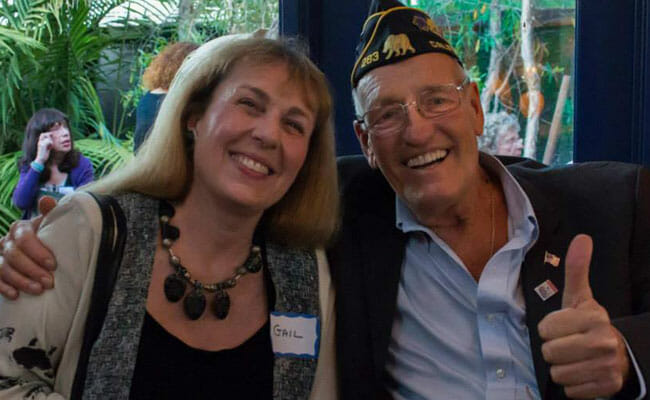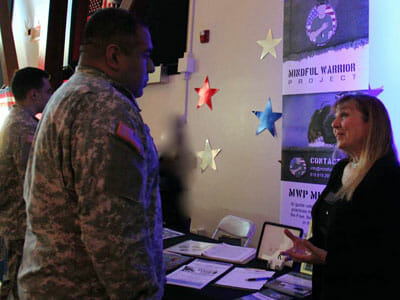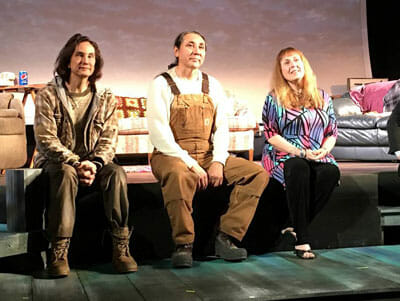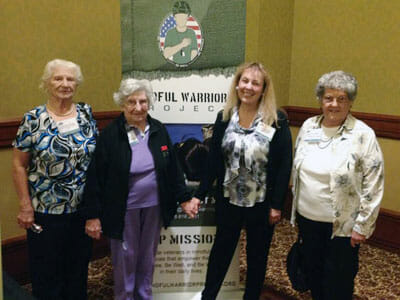Gail Soffer


“I was appalled by the statistic of 22 veteran suicides per day in our country. With all the resources I thought were available in the U.S., how could there still be such deep suffering and despair that our veterans could find their only remedy in taking their own lives?” says Gail Soffer. “After a lifetime of nonprofit work with international humanitarian aid and peace initiatives, how could I not try to help our veterans find a place of peace here at home?”
Gail Soffer is the founder and executive director of the Mindful Warrior Project. Combining vast experience in both nonprofit management and wellness modalities, she brings simple, secular mindfulness practices to veterans, as well as active duty, guard, and reserve, their family members, and their service providers to build a comprehensive community of care and support, so they can “Be Free, Be Well, and Be Whole” in their daily lives.

Soffer worked for and collaborated with a large number of organizations serving the military-connected population before launching the Mindful Warrior Project. Because of her experience, she was well aware of how much it takes to develop and maintain a sustainable and compliant nonprofit organization.
“I wasn’t sure I was equipped to venture into such a significant undertaking, especially one that would be addressing some huge challenges for those it would be serving,” says Soffer. “But I continued to witness obstacles to and gaps in service that resulted in many veterans falling through the cracks, cycling again and again through systems that just weren’t working properly, or, worst of all, giving up hope completely, with dire consequences. So, almost in spite of my better judgment, I felt compelled to go for it and offer a unique and specially customized program to those who serve and their support communities.”
Having been heartbroken that veterans who served before 9/11, those who hadn’t seen combat, those with other-than-honorable discharges, spouses/children/other family members, and others were not eligible for services with many agencies, Soffer has geared her programs and made them available to the widest possible military-connected population.
Not wanting location or transportation challenges to limit access to her programs, Soffer chose to be mobile and travel throughout Southern California. Workshops are provided in churches at vet centers, on military bases, at colleges, American Legion posts, YWCAs, and other locations convenient to veterans.

Soffer also sought to bridge the gap between the military and civilian communities by hosting events that would bring them together to break down stereotypes and barriers to respectful integration. Film screenings, preceded by short introductions to the Mindful Warrior Project’s work and followed by refreshment breaks and panel discussions have brought awareness on both sides of the divide to the history, current situations, and options of our veterans.
For the core of their work, within the safe, confidential, and military-friendly environment they create, Soffer and her team talk about what mindfulness is and isn’t. For the Mindful Warrior Project, it addresses issues all too common in the veteran population such as PTSD, depression, anxiety, TBI, problems with sleep, MST, rage, and substance abuse. They guide every group through a few simple practices so that, even after a single hour-and-a-half session, attendees walk away with a personal experience as well as tools they can practice on their own. Empowering veterans to participate in their own healing process, wellness, or simply quality of life is at the core of this work.
The relief provided by this simple yet powerful work shows up consistently as early as during someone’s first class. People suffering from anxiety, stress, and battling to fall asleep often find themselves asleep early into their first practice. Emails and calls pour in from those astonished that they could repeat the exercise on their own at home and wake up 8 hours later in the same position in which they lay down – something they haven’t enjoyed in 30 years. Another veteran reported, “Gail, because of you I’m not in jail. All those anger management classes didn’t help me; but this time I put my fist down and I walked and I breathed and I’m not in jail.”
Although Soffer’s team includes therapists, PhDs, and social workers, the primary qualifications for speaking about and guiding MWP’s mindfulness exercises are having understanding and respect for military culture and being solidly grounded in one’s own mindfulness practice.

“We are neither doing therapy – diagnosing and treating – nor teaching a spiritual/religious path or philosophy. We are speaking from our own depth of experience,” says Soffer. “My own practice goes back 39 years and has been the cornerstone of my life. Especially when veteran team members say with complete sincerity, ‘been there – done that – made it here – come join me’ it’s powerful. That’s not theory. That gives real hope. And the work delivers.”
The Mindful Warrior Project does not report to any agency and confidentiality is strictly maintained. That combined with the fact that mindfulness is about being ok to “be with what is,” exploring with openness and curiosity, and maintaining an attitude of non-judgment and openness, fosters an environment of trust, acceptance, and safety – both within oneself and with others. Workshop participants of all ages have felt comfortable sharing experiences and emotions that they have kept bottled up and express their amazing relief in the nods of understanding and absence of judgment from others. The isolation and frustration with feeling so dramatically different fade in the camaraderie of a group that “gets you,” where all are working toward a new sense of balance in the civilian world. The sense of finally making it home is priceless.
Whether it’s teaching mindfulness practices to military children via arts and crafts; training therapists, victim advocates, and case managers how to use mindfulness as self-care and with their military clients; facilitating a Cal Humanities book club focusing on “The Experience of the Warrior Across Time and Culture;” introducing complementary alternative modalities such as acupuncture and massage at Wellness Areas; or working directly with veterans on emotional intelligence and regulation through mindfulness practices, this work is healing the hidden wounds of war, restoring choice and dignity, and producing heartwarming transformations. The “What People Say” page of the Mindful Warrior Project’s website overflows with glowing praise.
Charlie Pacello, an Air Force veteran and key MWP team member, says, “The Mindful Warrior Project brings simple, effective tools to veterans to help them restore their well-being and counteract the effects of anxiety, stress, and depression. Mindfulness saved my life and I’m proud to help my fellow veterans discover and use these tools under the guidance of an organization and individual with such amazing care and integrity. Gail has been the driving force behind all this. Her determination, passion, dedication, and love for our veterans is supreme. She goes non-stop, 24-7, without any pay, as a volunteer like the rest of the team. She’s always making connections and is working on the front lines. She walks the walk and talks the talk. I’ve never seen someone work so hard for something she believes in in all my life.”
